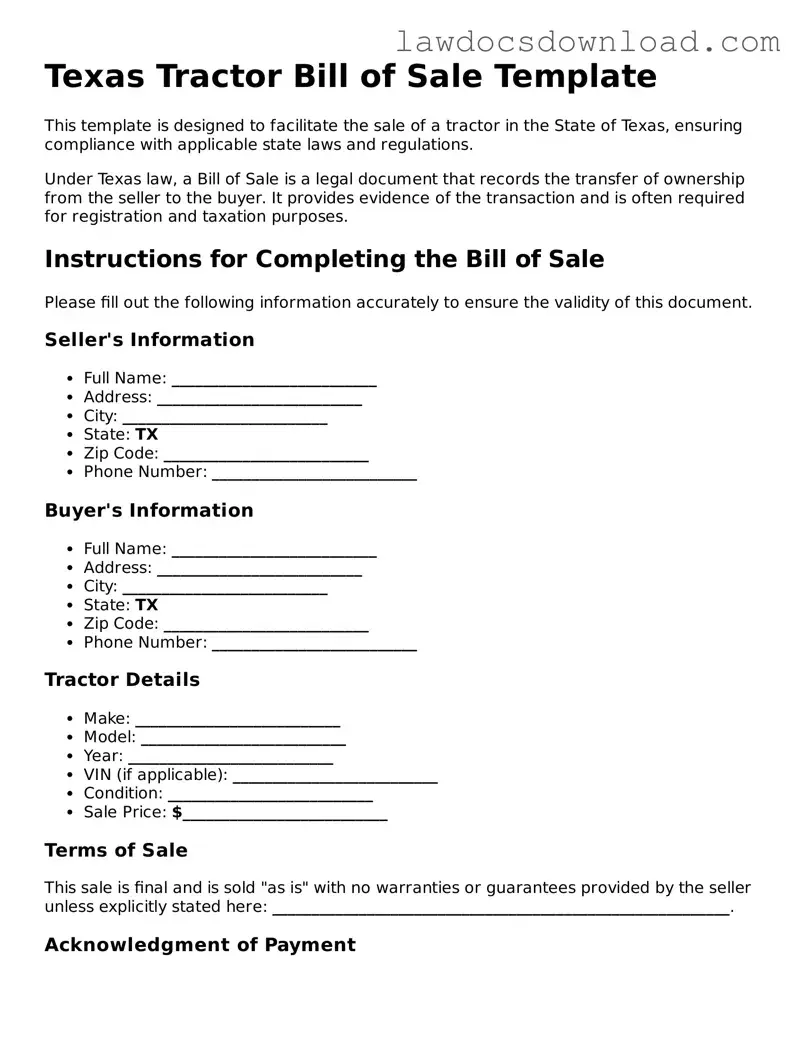The Texas Tractor Bill of Sale form shares similarities with the Vehicle Bill of Sale, commonly used when transferring ownership of a car, truck, or motorcycle. Both documents serve to legally document the transaction, detailing the make, model, year, and identification numbers of the machinery or vehicle sold, alongside the purchase price and date of sale. They also contain information about the buyer and seller, helping to protect both parties in the transaction.
Similarly, the Boat Bill of Sale is akin to the Tractor Bill of Sale, as it's used for the sale and purchase of a boat. Both require descriptions of the item being sold, including any identifying numbers (such as serial or registration numbers), the sale price, and particulars of the buyer and seller. These documents are crucial for the legal transfer of ownership and may be required for registration purposes in their respective categories.
The Texas Tractor Bill of Sale also has parallels with the Equipment Bill of Sale, which is utilized for the purchase or sale of machinery and heavy equipment, besides tractors. This document includes details like the make, model, condition, and any serial numbers of the equipment, ensuring a clear transfer of ownership and outlining the sale's specifics, mirroring the structure and purpose of the tractor bill of sale.
Similar to the Livestock Bill of Sale, the Tractor Bill of Sale serves a specific market - in this case, agriculture. The Livestock Bill of Sale is used when buying or selling animals, such as cattle or horses. Both forms include critical details such as identification markers (tag numbers for livestock and serial numbers for tractors), the parties involved, sale date, and price, safeguarding the agreement's terms.
The Firearm Bill of Sale is another document closely related to the Tractor Bill of Sale, especially in the context of outlining item specifics, buyer and seller details, and transaction terms. These forms are instrumental in recording the sale of regulated items, ensuring all necessary legal requirements are met and providing a record of ownership transfer.
The Texas Tractor Bill of Sale resembles the Aircraft Bill of Sale in that both are used for high-value assets requiring detailed records of the transaction, including identification numbers, make and model, and the parties' details. Each serves as a vital record for legal ownership transfer and may be necessary for registration with federal or state agencies.
Likewise, the Business Bill of Sale can be seen as a counterpart to the Tractor Bill of Sale when a business transaction involves the sale of company assets. This document outlines the particulars of the sale, including a description of the assets, the sale price, and the parties involved, ensuring a smooth ownership transition similar to the tractor sale scenario.
Another analogous document is the Furniture Bill of Sale, used for the purchase or sale of used furniture. Like the Texas Tractor Bill of Sale, it includes descriptions of the items being sold, the purchase price, and the parties to the transaction. Both documents serve as proof of purchase and transfer ownership under agreed-upon terms.
Lastly, the Mobile Home Bill of Sale closely resembles the Tractor Bill of Sale, with both being used for significant investments and requiring detailed information about the asset being sold, including any identification numbers, the purchase price, sale date, and both the buyer's and seller's information. This document is crucial for establishing legal ownership and ensuring the transaction's validity.

